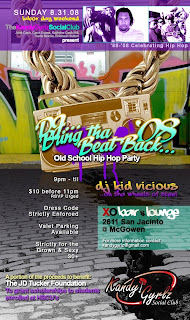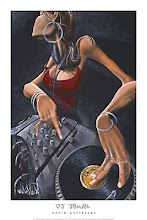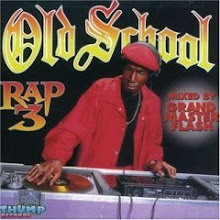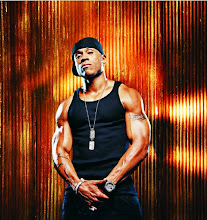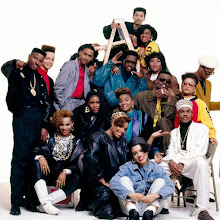Monday, December 1, 2008
Friday, August 29, 2008
We Heart 80's Hip Hop
It’s hard to believe it’s been 20 years since N.W.A. released Straight Outta Compton ushering in a new era of hip hop; an era that would forever change the game. Hip hop gave a voice and a sense of purpose to a generation who felt unheard and neglected. Hip hop was a friend and foe (as Common so poetically put on wax with I Used to Love H.E.R.). Hip hop consoled, gave courage, and confidence. And no matter what the critics try and tell you 80’s hip hop was hip hop’s BEST decade.
Some refer to hip hop's "golden age" as the period in mainstream hip hop around the late 1980s. 80's hip hop was diverse and innovative and the influence of the genre spanned the globe. There were also strong themes of Afrocentricity and political militancy, the music was experimental, and the sampling was eclectic.
It was about empowering youth to strive to be more and do more because for the first time we saw kids like us rising up from neighborhood’s similar to our own and they were doing their thing in a positive way and offering a new and different alternative to the abysmal futures that many thought was their fate. Hip hop in the 80’s was about unity in our community. Hip hop in the 80’s was about educating the masses on the rich history of black folks in this country. Hip hop in the 80’s was about partying and having a good time. Hip hop in the 80’s was a powerful movement that shaped an entire generation.
My only regret for many of the pioneers of the 80’s hip hop movement is that they were not educated enough on the business side of the industry. In hind-sight had they known just how GINORMOUS this thing we call hip hop was going to become they would have hopefully protected themselves better when it came to publishing and investing their money a bit wiser to secure their futures so, that when the inevitable day came to lay down the mic they would be able to live the lives they so richly deserve.
Long live 80’s Hip hop!!! We’re paying homage to the best decade in hip hop this weekend in H-Town and hope you will join us!! It’s going to be the ILLEST, DOPEST, FRESHEST JAM to hit the STATE this year!!! WORD TO THA MUTHA! Be sure to check back a week after the jump off to see exclusive photo's from this event!!!

Some refer to hip hop's "golden age" as the period in mainstream hip hop around the late 1980s. 80's hip hop was diverse and innovative and the influence of the genre spanned the globe. There were also strong themes of Afrocentricity and political militancy, the music was experimental, and the sampling was eclectic.
It was about empowering youth to strive to be more and do more because for the first time we saw kids like us rising up from neighborhood’s similar to our own and they were doing their thing in a positive way and offering a new and different alternative to the abysmal futures that many thought was their fate. Hip hop in the 80’s was about unity in our community. Hip hop in the 80’s was about educating the masses on the rich history of black folks in this country. Hip hop in the 80’s was about partying and having a good time. Hip hop in the 80’s was a powerful movement that shaped an entire generation.
My only regret for many of the pioneers of the 80’s hip hop movement is that they were not educated enough on the business side of the industry. In hind-sight had they known just how GINORMOUS this thing we call hip hop was going to become they would have hopefully protected themselves better when it came to publishing and investing their money a bit wiser to secure their futures so, that when the inevitable day came to lay down the mic they would be able to live the lives they so richly deserve.
Long live 80’s Hip hop!!! We’re paying homage to the best decade in hip hop this weekend in H-Town and hope you will join us!! It’s going to be the ILLEST, DOPEST, FRESHEST JAM to hit the STATE this year!!! WORD TO THA MUTHA! Be sure to check back a week after the jump off to see exclusive photo's from this event!!!

Wednesday, August 27, 2008
Dance Fever
 The dance style primarily associated with hip hop is breaking, which appeared in New York City during the early 1970s and truly became a cornerstone (or "element") of hip hop as a culture. Funk styles, such as popping and locking, evolved separately in California in the 1960-70s, but were also integrated into hip hop when the culture reached the West Coast of the United States.
The dance style primarily associated with hip hop is breaking, which appeared in New York City during the early 1970s and truly became a cornerstone (or "element") of hip hop as a culture. Funk styles, such as popping and locking, evolved separately in California in the 1960-70s, but were also integrated into hip hop when the culture reached the West Coast of the United States.Though breaking and the original funk styles look quite different stylistically, they share many surrounding elements, such as their improvisational nature, the music they're danced to and the way they originated from the streets, mainly within black and Hispanic communities. These similarities helped bring them, and other street dance styles, together under the same sub-culture, and help to keep them alive and evolving today. Yet, this has not been without problems, often involving the media, such as when the movie Breakin' put all various styles under the label "breakdance", causing a great naming confusion that spawned many heated debates.
In the late 1980s, as hip hop music took new forms and the hip hop subculture established further, new dance styles began appearing. Most of them were danced in an upright manner in contrast to breaking with its many ground moves, and were in the beginning light-footed with lots of jumping. Some moves hit the mainstream and became fad dances, such as The Wop, The Prep, The Running Man, The Cabbage Patch, The Fila, The Pee Wee Herman, The Smurf, The Gucci, and The Roger Rabbit, but overall they contributed a lot to later hip hop styles, and heavily influenced the development of house dancing. Just as common as it was for a MC to be accompanied by a deejay some MC's had back up dancers that danced while the MC rapped over beats. The most notable back up dancers in the 80's were Big Daddy Kane's dancers, Scoob and Scrap. Rappers also got in on the dancing as music videos became increasingly popular. While some rappers like MC Hammer made more of a splash with their moves than their rhymes other rappers would perform simple choreographed routines to their songs. Remember the "Shake Your Thang" video? Check it out and see how many dances you remember and start practicing your moves and join us at the FRESHEST party of the year!!

Monday, August 25, 2008
Word!

Hip hop culture has a language all it's own and each decade brings new vernacular to the genre. Once the language started crossing over to the white suburbs psychologists decided to give a name to our slang : EBONICS. But no matter what label you put on it one thing is for sure hip hop helped give a voice to a demographic in the 80's that was previously unheard.
B-Boy
The original term for style dancers. Also used to refer to pioneers of hip hop.
Beat Box
Big ass portable radio. (See L. L. Cool J’s song “Radio”)
Def
Very cool.
Use: “That beat box is def.”
Dope
More than cool.
Use: “ ‘Tougher than Leather’ is a dope album.”
Drop Science
Educate you.
Use: “KRS-1 be droppin’ science!”
Fly
Beautiful.
Use: “That girl is fly.”
Fresh
New and cool. Usually referring to the style of a person, place or thing.
Use: “You car is fresh!”
Homeboy
Partner. Friend or some other guy.
Use: “Don’t step on my Adidas, homeboy.”
Homie
Short for homeboy.
Hype
Message or propaganda. Can also refer to wild party.
Use: “Don’t believe the hype.” Or “This party is hype, man.”
Jack Move
Act of forcefully taking something from someone. Can include assault, theft, and robbery.
Use: “..ain’t no tellin when I’m down for a jack move.” Or “Those gangstas are about to do a jack move.”
Legit
Good. (Made more popular by M.C. Hammer in the 90s, but came from the 80s.)
Use: “This club is legit. It gets pretty hype at about 1am.”
NewJack
A rookie trying to prove himself on the streets. Can also be a sucka.
Step Off
Used to tell someone to stop annoying you or get out of business or just back up.
Use: “I wish my teachers would just step off!”
Sucka
A punk. A new jack. A fool. An idiot. A looser.
Use: “You think I'm a sucka, but I ain't the one.”
Posse
Group of people, friends or gang.
Use: “I was chillin’ with my posse.”
Funky Fresh Gear
Extremely cool clothes.
Rap
Urban poetry to a rhythm.
Human Beat Box
Art of urban vocal percussion; made famous by pioneers like the fat Boys, Doug E. Fresh, Biz Markie and others in the 80s.
Stupid
More than cool.
Sucka MCs
A punk, wimp, fake person attempting to rap and pretend too be tough.
Word to the Mother
Truth to the Mother land, Africa. I agree 100%.
Poppin' & Lockin'
dances with sudden stop start movements
Chill
Relax.
Use: “Just chill. You’ll get your money.”
Ill
Act like a fool. Can also refer to something slightly crazy but still cool or even something sickening.
Use: “That fool be illin’” or “That concert was ill, I liked it.” Or even “The dude threw up on stage and ate it, it was ill.”
B-Boy
The original term for style dancers. Also used to refer to pioneers of hip hop.
Beat Box
Big ass portable radio. (See L. L. Cool J’s song “Radio”)
Def
Very cool.
Use: “That beat box is def.”
Dope
More than cool.
Use: “ ‘Tougher than Leather’ is a dope album.”
Drop Science
Educate you.
Use: “KRS-1 be droppin’ science!”
Fly
Beautiful.
Use: “That girl is fly.”
Fresh
New and cool. Usually referring to the style of a person, place or thing.
Use: “You car is fresh!”
Homeboy
Partner. Friend or some other guy.
Use: “Don’t step on my Adidas, homeboy.”
Homie
Short for homeboy.
Hype
Message or propaganda. Can also refer to wild party.
Use: “Don’t believe the hype.” Or “This party is hype, man.”
Jack Move
Act of forcefully taking something from someone. Can include assault, theft, and robbery.
Use: “..ain’t no tellin when I’m down for a jack move.” Or “Those gangstas are about to do a jack move.”
Legit
Good. (Made more popular by M.C. Hammer in the 90s, but came from the 80s.)
Use: “This club is legit. It gets pretty hype at about 1am.”
NewJack
A rookie trying to prove himself on the streets. Can also be a sucka.
Step Off
Used to tell someone to stop annoying you or get out of business or just back up.
Use: “I wish my teachers would just step off!”
Sucka
A punk. A new jack. A fool. An idiot. A looser.
Use: “You think I'm a sucka, but I ain't the one.”
Posse
Group of people, friends or gang.
Use: “I was chillin’ with my posse.”
Funky Fresh Gear
Extremely cool clothes.
Rap
Urban poetry to a rhythm.
Human Beat Box
Art of urban vocal percussion; made famous by pioneers like the fat Boys, Doug E. Fresh, Biz Markie and others in the 80s.
Stupid
More than cool.
Sucka MCs
A punk, wimp, fake person attempting to rap and pretend too be tough.
Word to the Mother
Truth to the Mother land, Africa. I agree 100%.
Poppin' & Lockin'
dances with sudden stop start movements
Chill
Relax.
Use: “Just chill. You’ll get your money.”
Ill
Act like a fool. Can also refer to something slightly crazy but still cool or even something sickening.
Use: “That fool be illin’” or “That concert was ill, I liked it.” Or even “The dude threw up on stage and ate it, it was ill.”
Thursday, August 21, 2008
Imports

Ricky Walters (born January 14, 1965), better known by stage names Slick Rick, MC Ricky D and Rick the Ruler, is a British rapper-songwriter and actor. Originally from South Wimbledon, London, England, he moved with his family to The Bronx in 1975 where he met Dana Dane, later forming a hip hop duo as Kangol Crew.[1] Rick's characteristic eyepatch was acquired after being blinded in the right eye by broken glass as an infant. He is best known for a series of rap recordings during the 1980s, including "Children's Story" and "La Di Da Di", B-side of Doug E. Fresh single "The Show" (1985). Once he gained a degree of wealth, he earned a reputation for wearing an enormous amount of gold and diamond jewelry, including many large necklaces with giant pendants, bracelets, huge rings on each finger, and a gold tooth.

Simone Wilson or Simone Gooden (born July 2, 1970, in London) known by her stage name Monie Love, is a female, English rapper and former radio personality in the United States. Love was a well respected figure in British hip hop, and made an impact with American hip hop audiences as a protégé of female American rapper Queen Latifah, as well as through her membership in the late 1980s/early 1990s Native Tongues Posse. Love was one of the first BritHop artists to be signed and distributed world-wide by a major record label. Love also has a place in hip-hop history as a member of the Native Tongues Posse, a positive-minded hip-hop collective that included Queen Latifah, De La Soul, A Tribe Called Quest, the Jungle Brothers, and a number of other acts. Love's debut album, Down To Earth, spawned two, Grammy-nominated hits, "Monie in the Middle" (a high school-set track dealing with a woman's right to determine what she wants out of a relationship) and "It's a Shame (My Sister)" (which sampled The Spinners' "It's a Shame" written for the band by Stevie Wonder). The album reached #26 on the Top R&B/Hip-Hop Albums chart.
Wednesday, August 20, 2008
Tuesday, August 19, 2008
For All You Sucka's
Be sure to peep the "battle" between Run DMC, Special K and Kool Moe Dee at the end of the video.
Subscribe to:
Posts (Atom)
